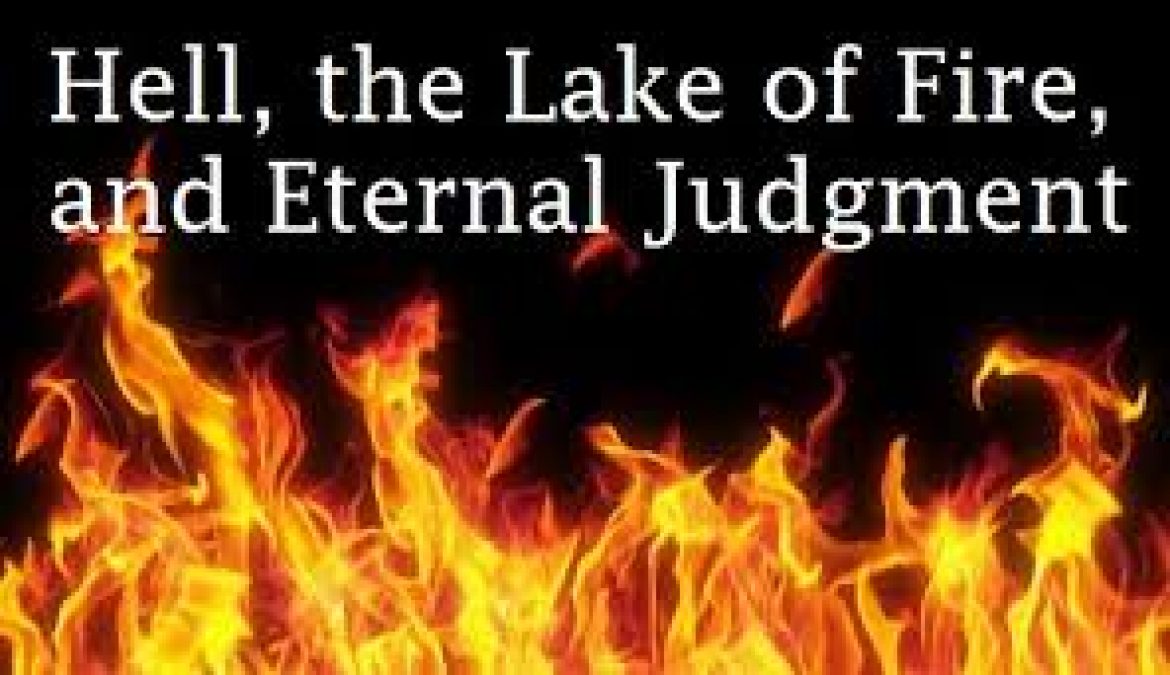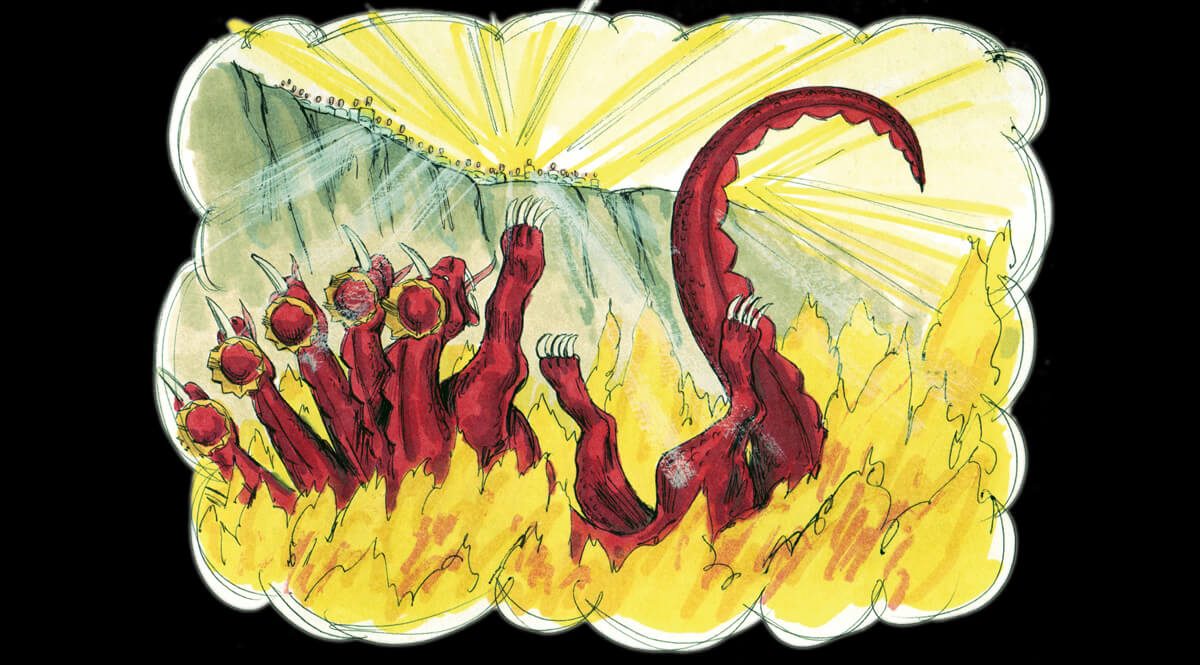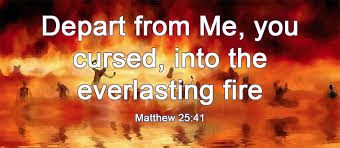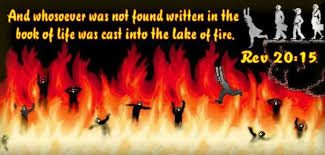
The Lake of Fire: Forever
Revelation 18
20 Rejoice over her, thou heaven, and ye holy apostles and prophets; for God hath avenged you on her.
21 And a mighty angel took up a stone like a great millstone, and cast it into the sea, saying, Thus with violence shall that great city Babylon be thrown down, and shall be found no more at all.
To say that Hell and the Lake of Fire are not a place of everlasting judgment is to call Jesus Christ a liar. Our Authorized Bible leaves no doubt about the eternal soul. Every one of us will spend eternity somewhere. Man could not be created in the image of God and not be created as an eternal being. Our consciousness is a powerful proof of its everlasting nature. The Creator made us to spend eternity with Him. Only the person can choose otherwise.
Recently the Catholic pope came down on the side of the New Age Movement. Many of the doctrines of his own past popes suddenly became null and void. Yet his church as declared that a statement or doctrine of the past popes cannot be false or disbelieved. Without a doubt the antichrist has invaded the realm of the church world.
My mind is boggled by what the new translators have done to Holy Scripture. They have not just made the Bible more readable, they have diluted its eternal message written from God to man. Great truths of the Word of God have been changed beyond recognition. Hell or everlasting judgment for the wicked is a case in point.
The changes discussed in this article are all from the New International Version (NIV). Hell is clearly changed to a place of eternal death, instead of a place of everlasting torment. First, let’s deal with the translators themselves. By their own admission, they do not believe in an eternal place called Hell or the Lake of Fire. In a special book, written to support the NIV, they include a chapter entitled, “Why Hebrew She’ol Was Translated ‘Grave’.” (The NIV: The Making of a Contemporary Translation, page 53-71.) Here are a number of quotes that I will provide (page numbers included) without comment:
“After all, the Old Testament nowhere says that Sheol (Hell) is the place of departed spirits.” (Ibid., p. 60.)
“Regarding further punishment after their death, the text (Numbers 16:30, 33) is silent. Psalm 55:15 is quite similar and probably means no more.” (Ibid., p. 61.)
“The curse on the wicked is that they might lie silent in the ‘grave’ (Sheol in Ps. 31:17).” (Ibid., p. 63.)
On Psalm 30:9: “The terms bor and shahat are used similarly to Sheol (Hell). The psalmist thanks God that he was spared from death, the pit, the dust, and the decay, where his dust would lie in silence and not take part in the worship of God. If Sheol (Hell) here refers to departed spirits, it proves too much! It would prove soul sleep at the least. Much better to find in these terms only a reference to the body and its decay.” (Ibid., p. 63.)
On Isaiah 38:17, 18: “It apparently refers to the grave as a place of decay.” (Ibid., p. 64.)
On Psalm 49: “With this in mind the contrast of verses 7-9 can well be seen as the futile desire of the wicked for eternal life versus the fact of their wasting away in the grave (v. 9). To ‘not see shahat’ seems to be more than continuing this life here and now. It is rather to live with God and not decay or ‘perish’ in the grave.” (Ibid., p. 64.)
“As Dahood has argued in his commentary on the Psalms, such passages affirm the hope of eternal life, whereas the wicked will not ‘live on forever and not see decay’ (Ps. 49:9).” (Ibid., p. 64.)
On Psalm 16:10: “Some by capitalization seem to particularize it as some underworld place . . . ‘Not to see shahat’ may well mean not to be left under the power of the grave with the consequent dissolution of the body into the dust of the grave.” (Ibid., p. 65.)
“The plainest interpretation of Psalm 16:10-11, therefore, is that the psalmist looks forward to deliverance from the grave. He will not be left there to decay, but God will take him to his heavenly abode.” (Ibid., p. 65.)
On the Book of Job: “In his second speech he still preferred death (7:15). He declared that the one who “goes down to Sheol” returns no more (7:9), and in this context said he would soon ‘lie down in the dust’ and be no more (7:21). To go to Sheol is to lie in the dust and never return.” (Ibid., p. 68.)
On Job 10:19-22: “The passage teaches us that similar references to Sheol elsewhere also mean no more than the darkness, dissolution, and dust of the tomb.” (Ibid., p. 68.)
This extensive list was meant to show clearly that the truth of Hell has been reduced to the cheap idea of decay or dissolution. The word Hell does not appear in the Old Testament of the NIV. The translators ignore the fact that every time the word death appears in the Hebrew, it is either muwth or maveth. Also, the word for Hell is always She’ol or She’owl, yet they used the meaning of the wrong word in every instance. The translators show no interest in the original Hebrew word, but simply replace the truth with their modern interpretation. I have never viewed a more blatant travesty of Scripture.
They did practically the same with the Greek of the New Testament. The main word for death in the original Greek is thanatas or thanatoo. It means exactly that,“death or to die.” The other Greek words translated in the King James Version as death also mean “death” in unquestionable terms.

Matthew 13
41 The Son of man shall send forth his angels, and they shall gather out of his kingdom all things that offend, and them which do iniquity;
42 And shall cast them into a furnace of fire: there shall be wailing and gnashing of teeth.
The main word for Hell in the Greek is geenna (gehenna) and means “a place of everlasting punishment.” A second New Testament word from the Hebrew is tartaroo. It means, “to incarcerate in the deepest abyss of Hell.” One additional word is Hades (hahdace), which means “a place of departed souls.” Every time the word Hell was used in a personal sense of someone going to this place, it was changed either to “depths,” the “grave,” or “Hades.” These words all are the lesser words, which in the original meaning had no mention of everlasting torment. The only time the word Hell was used was in impersonal statements, which carried a kind of warning without a specific end result. It appears that the word Hell was used by the NIV translators (New Testament) as a tongue-in-cheek saying instead of the dire consequence of everlasting torment.
Remember, their earlier statements that Hell (Sheol) was nothing more than “darkness, dissolution, and dust of the tomb.” (Ibid., p. 68.) How could men and women who claim to be evangelicals make such mistakes unless they are apostates or are ignorantly deceived? I believe they are either one or both.
The last incredible statement of the Holy Scripture concerning the Lake of Fire was robbed of its true meaning. This NIV Scripture states, “Then death and Hades were thrown into the lake of fire. The lake of fire is the second death” (Revelation 20:14).
Notice that Hell was changed to the weaker word Hades, but that’s not the biggest problem. The original text says, “And death and Hell were cast into the lake of fire. This is the second death.” (King James Version or Received Text/Textus Receptus). What is the difference?
This new version (NIV) changes the meaning of the second death. Second death is to be banished from the totality of God and all that He represents forever and to be confined to everlasting punishment. This new version adds, “The Lake of Fire is the second death.” It is not the second death, but rather the eternal location of those who experience the second death. There is a world of difference.

Thessalonians 1
7 And to you who are troubled rest with us, when the Lord Jesus shall be revealed from heaven with his mighty angels,
8 In flaming fire taking vengeance on them that know not God, and that obey not the gospel of our Lord Jesus Christ:
9 Who shall be punished with everlasting destruction from the presence of the Lord, and from the glory of his power;
The translators had already stated that death to the wicked is to be destroyed. Now, they are saying that the Lake of Fire is that destruction. In other words, the wicked do not spend eternity in the Lake of Fire, but are rather obliterated. I would presume, according to their testimony, that even this is symbolic rather than a real event.
The two men most responsible for the Greek and Hebrew text that constitute today’s new translations never hid their disdain for everlasting Hell. Hort said, “Hell is figurative.” (Hort’s Commentary On I Peter.) Westcott said, “Hell is not the place of punishment of the guilty, Hades is the common abode of departed spirits.” (Historic Faith, pp. 76-78.)
The Jehovah Witnesses and New Agers are ecstatic with the new versions. A New Age leader, Lola Davis, said, “We now know that there is no ‘down there’ where there is a tangible Hell.” (Toward A World Religion In The New Age, p. 10.) The NIV translators agree.
The text in the NIV, which deals with the rich man and Lazarus appears on the surface to be fairly clear. Here is the text in both the KJV and the NIV.
“There was a certain rich man, which was clothed in purple and fine linen, and fared sumptuously every day: And there was a certain beggar named Lazarus, which was laid at his gate, full of sores, And desiring to be fed with the crumbs which fell from the rich man’s table: moreover the dogs came and licked his sores. And it came to pass, that the beggar died, and was carried by the angels into Abraham’s bosom: the rich man also died, and was buried; And in Hell he lift up his eyes, being in torments, and seeth Abraham afar off, and Lazarus in his bosom. And he cried and said, Father Abraham, have mercy on me, and send Lazarus, that he may dip the tip of his finger in water, and cool my tongue; for I am tormented in this flame. But Abraham said, Son, remember that thou in thy lifetime receivedst thy good things, and likewise Lazarus evil things: but now he is comforted, and thou art tormented. And beside all this, between us and you there is a great gulf fixed: so that they which would pass from hence to you cannot; neither can they pass to us, that would come from thence. Then he said, I pray thee therefore, father, that thou wouldest send him to my father’s house: For I have five brethren; that he may testify unto them, lest they also come into this place of torment. Abraham saith unto him, They have Moses and the prophets; let them hear them. And he said, Nay, father Abraham: but if one went unto them from the dead, they will repent. And he said unto him, If they hear not Moses and the prophets, neither will they be persuaded, though one rose from the dead” (Luke 16:19-31, King James Version).
“There was a rich man who was dressed in purple and fine linen and lived in luxury every day. At his gate was laid a beggar named Lazarus, covered with sores and longing to eat what fell from the rich man’s table. Even the dogs came and licked his sores. The time came when the beggar died and the angels carried him to Abraham’s side. The rich man also died and was buried. In Hell, where he was in torment, he looked up and saw Abraham far away, with Lazarus by his side. So he called to him, ‘Father Abraham, have pity on me and send Lazarus to dip the tip of his finger in water and cool my tongue, because I am in agony in this fire.’ But Abraham replied, ‘Son, remember that in your lifetime you received your good things, while Lazarus received bad things, but now he is comforted here and you are in agony. And besides all this, between us and you a great chasm has been fixed, so that those who want to go from here to you cannot, nor can anyone cross over from there to us.’ He answered, ‘Then I beg you, father, send Lazarus to my father’s house, for I have five brothers. Let him warn them, so that they will not also come to this place of torment. Abraham replied, ‘They have Moses and the Prophets; let them listen to them.’ ‘No, father Abraham,’ he said, ‘but if someone from the dead goes to them, they will repent.’ He said to him, ‘If they do not listen to Moses and the Prophets, they will not be convinced even if someone rises from the dead” (Luke 16:19-31, New International Version).

Revelation 20
12 And I saw the dead, small and great, stand before God; and the books were opened: and another book was opened, which is the book of life: and the dead were judged out of those things which were written in the books, according to their works.
13 And the sea gave up the dead which were in it; and death and hell delivered up the dead which were in them: and they were judged every man according to their works.
14 And death and hell were cast into the lake of fire. This is the second death.
But, read what the translator said in the book, NIV: The Making Of A Contemporary. The writer said, “And Christ, in his illustration of the rich man and Lazarus, specifically tells of a great gulf between Abraham’s bosom, where Lazarus was (before the Cross!), and Hell, where the rich man was (in conscious torment).” (Parenthesis in original text.) (The NIV: The Making of a Contemporary Translation, page 60.) Clearly, the writer is disavowing any idea of a fiery judgment in favor of the subtle idea of a conscious misery. The Holy Bible says that the rich man was in need of water to cool his tongue because he was “tormented in the flames.” How did the translator reduce that to “conscious torment”?
Do not be deceived! The ignorance of present-day church members will not be excused on Judgment Day. Anyone who accepts a partial Bible, where the translators clearly disavow the absolutes of God’s Word, is responsible. Virginia Mollenkott (a task member of the NIV Committee), an avowed lesbian, feminist, mystic, etc., was calling for a de-absolutionized Bible a considerable time before the NIV was published. That’s exactly what the New International Version represents, a de-absolutionized Bible.
It’s not too late to repent! The blood of Jesus Christ will cleanse away your sins and you can be a redeemed and sanctified believer. The apostasy of this hour is an unquestionable sign of His soon appearing. Don’t wait!


